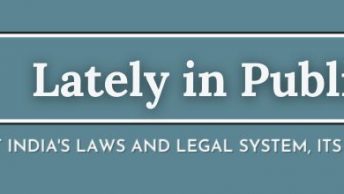A fortnightly feature inspired by I-CONnect’s weekly “What’s New in Public Law” feature that presents a curated list of public law-related work in the Indian legal space.
What’s New at LAOT
1. Nidhi Agarwal, Has India’s post-colonial status shaped the design and operation of the Indian executive- Part I and II (This two-part series argues that the executive entrenchment in India is a result of nexus between its postcolonial status with hints of British administration and ideologies of misrule).
2. Antonin Vergnes, France, the Republic and Limits to Constitutional Amendments: Learning from India (This comparative constitutional piece argues that France can draw inspiration from India on the limitations upon constitutional amendments as long as they are consistent with the republican framework of the French constitutional identity).
3. Summary of the arguments in Article 370 hearing (LAOT, in collaboration with the Center for Constitutional Law, NALSAR, is covering the proceedings before the Supreme Court in the landmark case on the abrogation of Article 370).
Lately in Academic Scholarship
1. Indian Journal of Intellectual Property Law recently published its third volume. Here are certain select articles from the issue:
i. Dr. Muhammad Z. Abbas, Patent Laws and the Public Health Puzzle: Comparing India’s Patent Opposition Model with the US and EU Model (Examines the evolution of Indian patent laws, and how India’s patent opposition mechanism can be used to improve access to health technologies).
ii. Rajshree Acharya & Aditi Rathore, Protecting Traditional Knowledge and Traditional Cultural Expressions Regionally: The SAARC Possibility (Examines the challenges of protecting TK and TCE under the current framework, and analyzes the need for a regional framework of protection for SAARC).
2. Shreya Rastogi, Forensic Science India Report: A Study of Forensic Science Laboratories (2013-2017), Project 39A (Examines trends in India’s forensic science laboratories and their challenges regarding budgets, education, management of cases, infrastructure, etc.).
3. Vandana Asthana, Governing Water Resources in India: Role of Water Law, Policy and Institutions, a book chapter from The Routledge Handbook of South Asia (Examines water policy, law and the institutional environment in which water allocation operates in relation to issues such as pollution, agriculture, sustainable development, access, etc.).
4. Priyansh Dixit, Sukarm Sharma, Balancing Privacy and Competition: Evaluating the Competitive Effects of India’s Data Protection Bill, Statute Law Review, OUP (Analyzing the competitive implications of India’s Data Protection Bill through areas of conflict such as mandatory data sharing, compliance costs, jurisdiction tussles, etc. with proposals for reform for future iterations of the Bill).
5. Aparna Chandra, Sital Kalantry & William H.J. Hubbard, Court on Trial: A Data-Driven Account of the Supreme Court of India (An overview of the Supreme Court and its processes, reflecting on key issues such as the disproportionate influence of senior advocates on case outcomes, the collegiate system, etc.).
Elsewhere in India
1. Annika Amber, Looking through the Caste Lens: Savarna Solidarities and Same-sex Marriage, Economic and Political Weekly.
2. Project 39A, Annotated Comparison of Bharatiya Nyaya Sanhita Bill, 2023 and Indian Penal Code, 1860; Annotated Comparison of Bharatiya Sakshya Bill, 2023 and the Indian Evidence Act, 1872; Annotated Comparison of Bharatiya Nagarik Suraksha Sanhita, 2023 and The Code of Criminal Procedure, 1973, The P39A Criminal Law Blog.
3. Abhinav Sekhri, The Judgment in V. Senthil Balaji v. State — On Arrest and ED Custody (Part One), and (Part Two), The Proof of Guilt.
4. Lubhyathi Rangarajan, Home Minister Amit Shah Says Sedition Is Dead. But Its Replacement Is More Fearsome Than The Colonial Law Ever Was, Article 14.
5. Niveditha Prasad, Trivialising Privacy through Tribunals in India: Analysing the Digital Personal Data Protection Act, 2023, Verfassungsblog.
6. Anmol Jain, An Attack on Indian Democracy: On the Bill to Curb the Independence of the Election Commission, Verfassungsblog.
7. Alok Prasanna Kumar, Perpetuating Illegality in ‘National Interest’, Economic and Political Weekly.
Listen up
1. Naveed Mehmood Ahmad and Jinaly Dany, Episode on Hamin Ast? A Biography of Article 370, Navi Books (Tracing the constitutional and legal history of Article 370 and analysing its sudden nullification whose political and legal ramifications are still unfolding).
2. Saurabh Kirpal and Shruti Rajagopalan, Saurabh Kirpal on the Constitutional Case for Marriage Equality in India, Ideas of India (Discussing the constitutional roots of marriage equality, fundamental rights, the role of the state, and problems and challenges of the Indian courts).
3. Rahul Matthan and Anirudh Burman, Exploring India’s Data Protection Law with Rahul Matthan, Interpreting India (Analysing the changes that the Data Protection law has undergone and its impact on Indian businesses).
4. Manoj Mitta and Anurag Verma, Battles for Equality in Hindu India by Manoj Mitta, Anurag Minus Verma Podcast (Delving into the history of caste and social reforms in India).
Opportunities and Other Things
1. Call for Applications for the post of Student Analyst by Law and Other Things Blog. The last date to apply is September 12, 2023.
2. 13th Padma Vibushana N.A Palkhivala research paper competition, 2023 by MNLU, Mumbai. The last date to register is September 15, 2023.
3. 4th National Amity Quiz on Constitutional Law by Amity Law School, Lucknow Campus. The last date for registration is September 15, 2023.
4. 1st Essay Competition on International Trade Law by ITLJ-NLIU, Bhopal. The last date to submit is October 5, 2023.
5. Call for Submissions by Journal for Law and Justice by Law Centre-II, University of Delhi. The last date for submission is October 31, 2023.
6. Call for Papers by Indian Journal of Constitutional Law, NALSAR. The last date to submit is November 30, 2023.
This initiative was started by Eeshan Sonak, Aditi Bhojnagarwala, Jeetendra Vishwakarma, and Saranya Ravindran from the Law and Other Things Student Team with the guidance of Surbhi Karwa and Gaurav Mukherjee.
Please contact the student editorial team of the LAOT Blog for any queries or to write for us at laotnalsar@gmail.com.




[…] Posted byLAOT Team […]